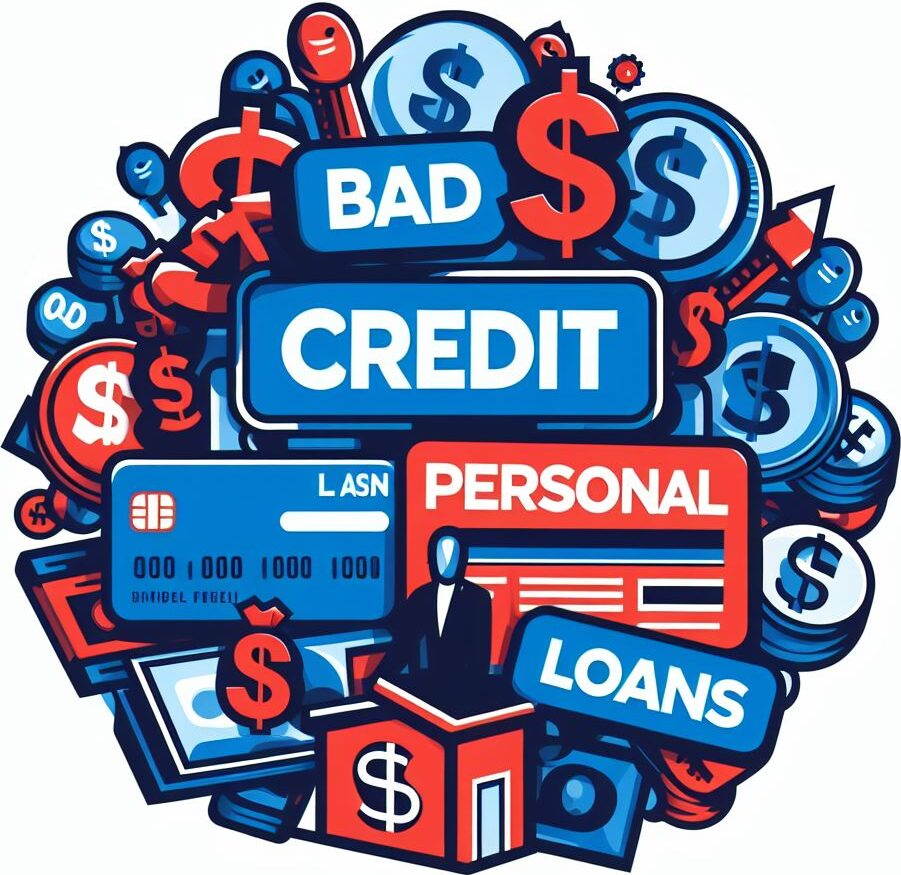Let me help you understand what a credit score really is. It’s not just a random number; it’s a vital indicator of your financial health. Essentially, it’s a summary of how well you manage debt and payments. Credit bureaus calculate this score based on your credit history, types of credit, and several other factors.
Differentiating between ‘bad’ and ‘good’ credit is crucial. Typically, scores below 580 are considered ‘bad,’ while anything above 670 is ‘good.’ But this isn’t just about numbers; your credit score can either open doors to new opportunities or leave you facing high-interest rates and loan rejections.

You’re going to find out about how bad credit affects much more than just borrowing money. It can impact your ability to rent an apartment, secure a cellphone plan, or sometimes even land a job. That’s right, bad credit can have a ripple effect on several aspects of your daily life.
So why do people end up with bad credit? Well, it could be due to missed payments, high credit card balances, defaults, or bankruptcies. Identifying what caused your bad credit is the first step toward fixing it.
Next up, it’s important to get your hands on your credit report. It’s the blueprint to your financial comeback. You can legally obtain it for free once a year from the major credit bureaus, and this is what I’ll guide you through in the next section.
Assessing Your Credit Report: The First Step to Repair
You’re going to find out about getting your credit report, which is like getting the medical charts of your financial health. It’s the first big step you need to take if you’re serious about fixing bad credit quickly. You are entitled to a free credit report every year from each of the three major bureaus: Equifax, Experian, and TransUnion.
I’m here to help you with understanding the nitty-gritty of your credit report. It’s basically a list of your credit accounts, debts, and your payment history. Don’t worry too much about the jargon; focus on the accuracy of your personal information, credit inquiries, account histories, and public records.
In my opinion, identifying errors on your credit report is a chance not to be missed. A study by the FTC revealed that one in four people found credit report errors that could affect their scores. I want you to be thorough. If you spot mistakes, file a dispute with the credit bureau—this can lead to quick enhancements in your score.
For those legitimate negative marks, you can always adjust your approach down the road. We’ll be talking about some clever ways to handle these in the next section. Remember, this isn’t just about fixing errors; it’s also about building a strategy for the future.
Strategic Actions to Rebuild Your Credit
Now, it’s time to roll up your sleeves and get down to the business of rebuilding your credit. Tackling this head-on will require a structured plan and consistent effort.
One of your first moves should be to prioritize debt payments. If you’re dealing with various types of debt, it’s smart to pay off those with the highest interest rates first, often credit card debt. This doesn’t just minimize the amount of interest you pay over time. It also helps improve your credit score by reducing your credit utilization ratio, which is a big factor in how your score is calculated.
Another strategy involves negotiating with creditors. It might sound daunting, but many lenders would rather settle for a partial payment than nothing at all. If you can offer a lump sum in exchange for having negative items removed from your credit report, it’s worth having that conversation. Always get agreements in writing before you pay.
Credit builder loans and secured credit cards can also serve as valuable tools in your arsenal. Unlike traditional loans or credit cards, these products are designed specifically for individuals who need to establish or rebuild credit. By ensuring you make all payments in full and on time, you demonstrate responsible credit behavior which can help boost your score. Just make sure to choose products with favorable terms and low fees.
Lastly, setting up payment reminders or automatic payments is a lifesaver for staying on track. It’s easy to get busy and forget a payment, but even one missed payment can ding your credit score. Automating payments—or at least getting a nudge from a reminder—can protect your score from unintended harm.
Maintaining Good Credit Habits for a Sustainable Future
I’m going to walk you through some essential habits that will not only help you maintain the good credit you’ve worked hard to rebuild but also secure a sound financial future. One significant step is crafting a solid budget. This isn’t just about tracking expenses, it’s also about preventing the kind of spending that led to bad credit in the first place.
Regularly checking your credit report is another habit you’ll want to adopt. You’re going to find out about any unexpected changes or potential fraud early on. Plus, it’ll keep you focused on your credit goal.
Now, using credit facilities responsibly is crucial for keeping your credit score on the rise. That includes knowing when and how much credit to use to maintain a favorable credit utilization ratio – it’s important to aim for less than 30% of your available credit.
Remember, improving your credit score isn’t a sprint; it’s more of a marathon. Time is one of your most powerful allies when it comes to credit repair. By consistently making on-time payments, you are showing potential lenders that you’re a reduced risk. Your first attempt at repairing your credit doesn’t need to be your last, but by staying disciplined with these practices, it greatly minimizes the chances of needing to go through this all over again.
In my opinion, patience, paired with responsible financial behavior, will always be your best tools for maintaining a healthy credit score. If you’re facing challenges or uncertainties, don’t worry too much about it. Seek out credible financial advice, adjust your strategy as necessary, and you can always stay on the right track towards financial stability.

Gary, this is an incredibly insightful post! Your thorough explanation of what a credit score entails and how it impacts various aspects of life is enlightening. The step-by-step guidance on obtaining and assessing a credit report is particularly valuable, especially the emphasis on identifying and disputing errors, which can often be a quick win for improving scores. I appreciate your practical tips on debt prioritization, negotiating with creditors, and utilizing tools like credit builder loans and secured credit cards. The advice on maintaining good credit habits is a reminder that credit repair is a long-term commitment. Thank you for breaking down complex concepts into actionable steps and making the process feel achievable!
– Scott
Thank you so much, Scott! I’m glad you found the post helpful and insightful. Understanding credit scores and taking steps to improve them can indeed have a significant impact on various aspects of life. I’m pleased that the guidance on obtaining and assessing credit reports, as well as the tips on debt prioritization and negotiating with creditors, resonated with you. It’s true that maintaining good credit habits is key to long-term success. Thanks again for your kind words and support!
#CreditScore #CreditReport #DebtManagement #FinancialTips #CreditRepair #MoneyManagement #FinancialAdvice #CreditBuilder #SecuredCreditCards #LongTermCommitment
Jeff